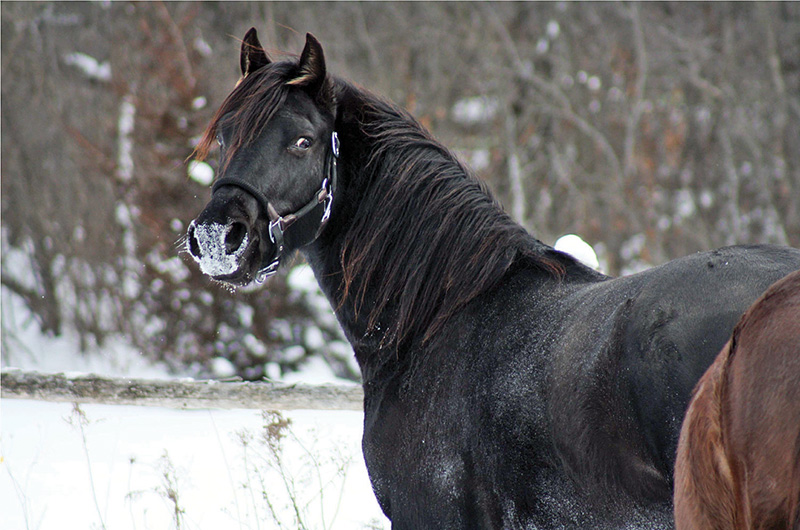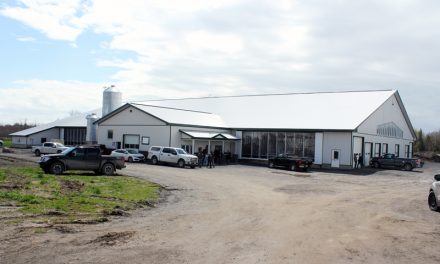Bringing your horse to a new barn
Courtesy Photo
By Caylyn Walker
AgriNews Contributor
Bringing a horse home is an exciting time, but it can be stressful for your new equine friend. Your horse will not only experience a change of routine, but also new herd mates, new caretakers, new turnout or stalling situations and potentially a new climate as well. Some horses adapt to these changes a bit easier than others, but it is important to be mindful of how the horse is adjusting. It is always a good idea to allow your horse time to settle into his new life and spend some time bonding with his new partner.
Often upon arriving to a new barn it will be necessary for your horse to be in quarantine away from the other horses for a period. Generally, it is recommended that new horses be quarantined for roughly two weeks and monitored for a fever, runny nose, or other evidence that they may not be well during this period. Using these quarantine procedures helps to ensure diseases are not spread from one barn to another when new horses come to the property. During this time, it is important that separate water buckets are used and that any brushes, blankets, saddle pads or other equipment used on the horse is not shared with others. This quarantine period can put additional stress on your horse as horses are herd animals and being away from companionship, even in a familiar setting, can be upsetting. It is not unusual for a horse to be more reactive, pace, or call to friends when they are upset. Tasks such as standing for grooming or tacking can prove to be difficult for horses when they are stressed but remember to be patient with your horse. They are experiencing a large life change and the stress they are exhibiting is normal. As your horse settles in, this stress too will subside and many of these anxious behaviours they may exhibit upon initial arrival will also subside.
Before throwing a leg over your horse and going for a ride, it is always a good idea to hand walk your horse around his or her new surroundings. Allow your horse time to see the arena or ring you will ride in and explore the different sights and smells of the property they are on. Things such as mirrors or equipment in the arena may be foreign and scary to your horse. Yard items such as tractors, harrows and even barnyard animals can be alarming to horses as well. Be sure to take the time to show items such as these to your horse and reassure them. It is possible your horse is seeing some of these items for the first time and remember that if they are harbouring stress from moving, they will be more reactive to items than they may otherwise be, when they are less stressed.
Lunging can also be a good idea while your horse adjusts to his or her new home. Short lunge sessions will provide information on how well your horse is able to focus. Are they distracted? Do they seem lazy or are they rushing? This time will also give you an opportunity to get to know your horse. How do they react to objects they are intimidated by? In what parts of the arena do they seem more alert? Are their certain parts of the arena they move more quickly past or that they don’t want to go to? These questions will give insight on how your horse is managing in the environment and how quickly they are settling in.
From a health perspective, it is important to monitor the feed and water intake of your horse as well once they arrive in their new home. Often horses will refuse to drink water with which they are unfamiliar, and this can lead to devastating colic or other medical problems. By monitoring your horse’s water intake, you can take action if you note that they are not consuming what they should be. Changing your horse’s diet can also lead to digestive upset. Where possible, it is a good idea to feed similar amounts and type feed products to what the horse was receiving in its past home. In time, the feed your horse is receiving can be changed, but gradual change to feed is always recommended in order to avoid digestive upset. Certain horses are quite sensitive to feed changes and need dietary supplements to stay healthy. It is best to check with the past owner to ensure you have these things on hand when your horse arrives in your care.
Horses can be prone to developing ulcers when they are stressed, and it is often recommended to give your horse an ulcer treatment preventatively during this time of transition. You can talk to your veterinarian about recommended products and dosages to help prevent painful ulcers in your new friend. Typically, these products are given before the horse is moved from their current home and is continued for a few days once they arrive in their new home.
Though in the short term your horse might feel stressed out after a move, but with time and some patience, your horse will adjust to their new surroundings and settle in. Ensuring the place they are coming to is properly and safely set up for horses is key to this adjustment being successful, and we will talk about that in our next article!
Join us next month for part 16 of this series!













